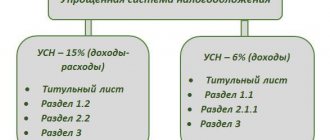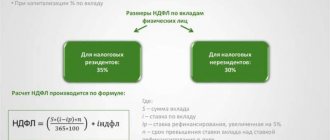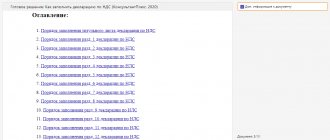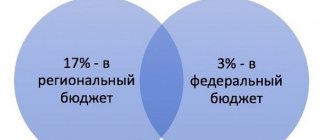Payments subject to personal income tax
The Tax Code of the Russian Federation contains a fairly wide list of income of individuals that are subject to personal income tax. According to Article 208 of the Tax Code of the Russian Federation, the following payments are subject to income tax:
- funds received under a property lease agreement from an individual;
- money received from the sale of own property, shares or securities;
- wages (including other forms of employee remuneration) and money for performing work or providing services;
- income in the form of dividends and interest received from Russian and foreign companies and organizations.
Note that Chapter 23 of the Tax Code of the Russian Federation contains a list of requirements for income that are subject to taxation and which are not subject to personal income tax in 2020.
Salary income tax in 2020
Salary is the main type of income for most citizens. To replenish the federal budget, earnings are subject to personal income tax. The employee pays it, and the employer, the tax agent, withholds it. We will tell you about the calculation and transfer of tax, benefits and deductions for income tax.
An individual’s income is not only a salary. These include prizes in competitions, dividends received, bonuses and incentives at work and not necessarily in the form of money. Gifts in kind are also subject to personal income tax.
Income tax is calculated as follows:
Personal income tax = (Taxable income - Deductions) * 13% (or 9%,15%,30% and 35%)
Taxable income is all types of earnings not listed in Article 217 of the Tax Code of the Russian Federation. Here is a list of income on which income tax is not taken:
- state benefits for unemployment, childbirth;
- pensions;
- payments for children;
- compensation for damage to health, etc.
Income tax rate
First of all, the rate is affected by residency status . Resident - a person who has been in Russia for more than 183 days and does not leave it during this period. Otherwise, the payer will be recognized as a non-resident.
13% of income is deducted from residents' salaries . However, there are also more specific rates. For example, 35% - for winnings over 4,000 rubles, for interest on deposits and coupons on bonds, and so on.
Personal income tax of 30% is taxed on income from certain securities. The lowest rate of 9% is available for mortgage-backed bonds that were issued before 01/01.
2007, and for the income of the founders of trust management of mortgage coverage.
For non-residents, 30% is deducted from their income, but there are exceptions . For example, a rate of 15% is relevant for non-residents who receive dividends from domestic companies. Foreigners can claim 13% personal income tax under the following conditions:
- they are highly qualified specialists;
- they are crew members of sea vessels flying the flag of the Russian Federation;
- they are refugees;
- they are participants in the state program for the resettlement of compatriots;
- they work for hire under a patent.
Tax deductions for personal income tax
It is not necessary to pay the full tax. The legislator allows the use of the right to receive deductions to reduce the tax base. You can reduce the tax payable in different life situations: buying a home, paying for treatment or education, and so on. Here are the most common options:
- standard deductions, for example, deductions for children - 1,400 rubles for 1 and 2 children, 3,000 rubles for subsequent ones, or a deduction for Heroes of the USSR and the Russian Federation, participants of the Second World War, blockade survivors, disabled people, and so on - 500 rubles;
- You can get a property deduction for purchasing a home or paying mortgage interest;
- You can claim a social deduction for training yourself, brothers, sisters, children or treatment;
- professional deductions are relevant for individual entrepreneurs, notaries, lawyers, etc.
For example, an employee receives 60,000 rubles per month. Without additional conditions, personal income tax on salary will be 7,800 rubles. And if an employee has 4 children, then the income tax for the month will be:
(60,000 - 1,400*2 - 3000*2) * 13% = 6,656 rubles.
It is impossible to “go into the red” within a year. Only the amount of personal income tax that was paid is accepted for deduction. In addition, many deductions are limited in amount. For example, in 2020, Ivan Sidorov paid for university tuition for 150,000 rubles. He will accept only 120,000 rubles for deduction. This is the maximum for training costs.
The deduction can be used in two ways. The first is to reduce the current personal income tax payable. The second is to apply to the Federal Tax Service and withdraw the income tax paid for the previous year. Then the tax office, after conducting a desk audit, will return the amount due to the account in a lump sum.
Income tax withholding
Article 226 of the Tax Code of the Russian Federation obliges the employer to deduct income tax from employee salaries. Calculation occurs monthly on an accrual basis. In practice, personal income tax calculation is done on the day the salary is paid - on the last day of the month. First of all, tax is deducted, and then other payments: alimony, loan repayment, etc.
Within a month, the deduction amount may exceed the personal income tax base. Then the income tax is equal to or less than zero. Excess tax is carried over to the next month, but only within the year. At the end of the year, excessively withheld personal income tax is not carried over to the next year. The exception is property deductions.
Deadlines for transferring personal income tax
The terms vary depending on the method of salary payment:
- in cash - the day the tax is transferred is equal to the day the money is received from the bank;
- non-cash payment - the next business day after the salary is transferred to the employee;
- other sources, including the issuance of income in kind - the next working day
It is important to distinguish between the concepts: transfer and withhold personal income tax. The transfer is usually made the next day after the salary is paid, and is withheld on the same day.
Personal income tax is transferred to the Federal Tax Service, where the company is registered. Branches transfer the tax to the tax office where they are registered.
Personal income tax from advance
The Labor Code in Article 136 of the Labor Code of the Russian Federation establishes the payment of wages at least once every half month. The first part is known as an advance - salary for half the month worked. The second part is the rest of the salary for the second half. The interval between issues cannot be more than 15 days .
Employee income is subject to personal income tax. At first glance, it seems that income taxes need to be withheld twice a month. The first is from an advance payment, the second is from the remaining salary. But that's not true. There are two reasons.
Firstly, Letter of the Federal Tax Service No. BS-4-11/ [email protected] dated 05/26/14. It directly states: income tax is withheld from the full salary upon final payment once a month. That is, personal income tax is not paid on the advance .
Secondly, Letter of the Ministry of Finance No. 03-04-06/33737 dated July 10, 2014. The ministry shares the position of the tax authorities. Personal income tax can only be deducted from the full salary. Advance payments are not subject to income tax .
For example, an employee’s salary is 50,000 rubles. Advance - half the salary. As a result, he will be given 25,000 rubles in advance. From the second part, 6,500 rubles of tax will be withheld and 18,500 rubles will be handed over.
But there are exceptions to this rule:
- the advance was issued on the last day of the month - income tax is withheld and transferred the next day;
- the employee has a personal income tax debt - the amount must be withheld from the advance payment in favor of repaying the debt, while personal income tax is not charged on the advance itself;
- the employee was given income in kind or he received a benefit - this income is subject to personal income tax, which must be withheld from the next cash payment, even if it is an advance, and personal income tax is not charged on the advance itself.
Income that is not subject to income tax
Information on payments that are not subject to income tax is contained in Article 217 of the Tax Code of the Russian Federation. This applies to all individuals. Status is not taken into account in this case. The differentiation of payments helps to avoid disputes with tax officials.
Both the accountant and the employee should know which payments are not subject to personal income tax in 2020. We have collected all income not subject to income tax in the table below.
Table. Income that is not subject to personal income tax in 2020
| Type of payment | A comment |
| Alimony | Does not depend on the size of the payment |
| Pension payments | Not subject to personal income tax and additional payments and benefits for pensioners (except for sick leave benefits) |
| Scholarships | Payments as part of training at universities and mid-level educational institutions |
| Grants (free assistance) | Can be provided both by the state and by special organizations (the list of organizations is in the special list of the Government of the Russian Federation) |
| One-time payments | This also includes financial assistance: to the family of a deceased employee who worked in the company, to employees of the organization who have lost loved ones and relatives, to employees of the organization who became parents (or adoptive parents) during the first year - there is no personal income tax for amounts up to 50,000 rubles for both parents |
| Financial assistance to retired employees | Regardless of the reason for leaving work (disability or old age). There is no income tax if the payment amount is less than 4,000 per year |
| Compensation payments | Applies to the following payments (both at the federal and regional levels): reimbursement of expenses for utility bills, compensation for damage caused at the place of work or received in connection with dismissal (compensation for unused vacation is not taken into account) |
| Daily allowance | Within the Russian Federation – no more than 700 rubles per day for a business trip. For foreign business trips – no more than 2,500 rubles per day |
| Reimbursement of treatment expenses | This includes payments not only to current employees, but also to former employees who have retired. |
| Payment for treatment of an employee or his family from the employer’s income | Refers to employees laid off due to retirement. Personal income tax is not charged only if the funds were taken after taxes from the company’s profits |
| Present | It does not matter who the gift was received from - from an individual entrepreneur or from an organization. Income tax must be paid. |
| One-time benefit for the birth of a child | A benefit in the amount of 50,000 rubles at the birth of a child is not subject to personal income tax (Article 217 of the Tax Code of the Russian Federation) |
The payments contained in the table do not require payment of personal income tax by both residents and non-residents of the Russian Federation.
Payments to legal entities
Compensation payments of organizations to employees (clause 3), in connection with:
- compensation for damage caused to health
- dismissal of employees (except for payments for unused vacation)
- expenses for advanced training
- Expenses of board members for travel and accommodation at the location of the board of directors or any other meeting
- Payments to retired employees. Amounts of costs of vouchers to boarding houses and other health institutions purchased for employees and their children under sixteen years of age (clause 9). Amounts transferred by employers, religious. organizations and NPOs for the provision of medical services to their employees/members and close relatives (clause 10)
- Amounts of wages and other payments in foreign currency made by government agencies and legal entities. individuals persons sent to work abroad (clause 12)
Income from joint stock companies and other organizations (clause 19) with:
- Distribution of received income between shareholders
- Legal reorganizations person (or NPO) and distribution of his property
Expenses of organizations and individual entrepreneurs for payment for technical means of preventing employee disability (clause 22)
Amounts not exceeding 4,000 rubles (clause 28), included in:
- Financial assistance from legal entities to their current and former employees
- Reimbursement of expenses for medications purchased by company employees and their immediate relatives
- Gifts from organizations and individual entrepreneurs to their employees
Also not subject to tax:
- Employer contributions transferred to state funds under the law “On additional insurance contributions...” (clause 39)
- Organizational expenses related to repayment of interest on employee loans (clause 40)
- Income in the form of food products provided to employees involved in field work (clause 44)
- Income of individuals persons in the form of dividends from which tax has already been withheld, in accordance with Article 312 of the Tax Code of the Russian Federation (clause 58 of Article 217 of the Tax Code of the Russian Federation)
- Amounts paid to employees employed in priority regions of the Russian Federation, in accordance with Law No. 1032-1 (clause 59)
- Income transferred in cash to the shareholder/
- The next type of income is the amounts received by individuals. persons from state budgets. Among them, the following are not subject to taxes:
- Benefits (clause 1 of article 217 of the Tax Code of the Russian Federation), pensions (clause 2, clause 38, clause 48, clause 48.1, clause 53, clause 54), compensation (clause 3, clause 37.2, p. .42)
- Grants allocated by the Russian government and foreign funds (clause 6)
Payments to participants of various events, such as:
- international competition P.I. Tchaikovsky (section 7.1)
- elections of candidates for the President of the Russian Federation, deputies of the State Duma, municipalities, etc. (clause 30)
- Rewards for assistance in preventing terrorist acts and assistance to the security forces of the Russian Federation (clause 8.1). Compensation for victims of terrorism (clause 8.4, clause 46). Compensation to the families of those killed and injured during natural disasters (clause 8.3)
- Scholarships (item 11). Payments to military personnel undergoing military service and military training (clause 29). Income in the form of real estate received by an individual free of charge from the State (clause 41)
- Subsidies and grants allocated for the development of farming (clause 14.1, clause 14.2)
- Rewards for transferring the found treasure to the State (clause 23)
- Interest on Russian bonds (clause 32)
- Payments to large families (clause 34) and amounts allocated for the construction and purchase of housing (clause 36, clause 37). Income in the form of partial payment amounts for the purchase of vehicles (clause 37.1)
- Cash benefits allocated by the State for repayment of interest on loans (clause 35)
- Payments and income in the form of emergency assistance to tourists (clause 55)
New types of income that are not subject to personal income tax
Article 217 of the Tax Code of the Russian Federation was supplemented with some new clauses:
- one-time supplement to pension (clause 8.5 of Article 217 of the Tax Code of the Russian Federation);
- monthly payments to military veterans (clause 69 of article 217 of the Tax Code of the Russian Federation);
- payments to some self-employed people, namely: nurses, tutors, housekeepers, cleaners if they inform the tax authorities about their occupation (clause 70 of article 217 of the Tax Code of the Russian Federation).
In 2020, the list of income not subject to personal income tax was expanded again.
According to Federal Law No. 147-FZ dated June 17, 2019, these payments relate to certain types of income:
- payment by the employer of the cost of travel to the vacation destination in Russia for employees working or living in the Far North;
- compensation payments to health workers up to 1 million rubles;
- compensation in exchange for the due land plot;
- income received by Heroes of the Soviet Union and the Russian Federation and Heroes of Labor;
- payments to citizens exposed to radiation;
- income received by disabled people or disabled children, as well as the amount of payment for additional days off provided to persons caring for them;
- income received as part of social support;
- payments to honorary donors.
Non-taxable income must be reflected in the 2-NDFL certificate if:
- the Tax Code has a limit on the amount of income that is not taxable;
- there is a separate code.
In any other situations, there is no need to indicate payments without tax in the 2-NDFL certificate.
List of income not subject to personal income tax
The income on which an individual pays tax is indicated in Article 208. Tax Code of the Russian Federation. Their list consists of amounts received from sources in the Russian Federation and abroad. In particular, personal income tax is paid on wages, royalties, income from the sale or rental of real estate, a number of benefits (including temporary disability), dividends, etc.
The list of non-taxable personal income tax income is much larger - now it includes more than 75 items, and from January 2020 there will be even more of them. It applies to both tax residents and non-residents. This feature of Article 217 of the Tax Code of the Russian Federation is reported in Letter of the Ministry of Finance of the Russian Federation No. 03-04-06/6-125 dated June 18, 2010, which states that the types of income contained in it are excluded from taxation regardless of the status of the taxpayer.
So, in 2020 and 2020. The following income of individuals is exempt from personal income tax:
- pensions – insurance, funded, state, as well as social supplements to these pensions;
- maternity capital, “Putin” payments for the 1st and 2nd child, provided for by Law No. 418-FZ of December 28, 2017 for low-income families;
- various types of compensation established by law - compensation for harm to health, payment of the cost of meals or sports equipment for athletes, free housing, etc.;
- daily allowance (within 700 rubles/day – for domestic business trips, 2500 rubles/day – for foreign business trips);
- cash rewards for “self-employed” caregivers, tutors, and au pairs received in 2017-2019. (if they notified the tax authorities about their activities and did not involve hired workers in them);
- unemployment benefits, maternity benefits;
- alimony received;
- financial assistance paid to employees, the cost of gifts given to them (in total, no more than 4,000 rubles per year are not taxed), etc.
In addition to the above-mentioned Article 217 of the Tax Code of the Russian Federation, the code contains a rule establishing the conditions under which personal income tax is not paid on income received from the sale of real estate (Article 217.1 of the Tax Code of the Russian Federation). From January 2020, some of its provisions will be supplemented.
Personal income tax benefits for debtors
From January 1, 2020, Federal Law No. 210-FZ of July 26, 2019 exempts bad debts of individuals from personal income tax. Such income includes income in the form of debt to organizations or individual entrepreneurs, from the repayment of which the taxpayer is fully or partially exempt due to the recognition of such debt as uncollectible.
Two conditions must also be met:
- an individual should not be dependent on the lender and should not be in an employment relationship with him;
- income should not be financial assistance or a form of counter-fulfillment of an obligation to an individual.
What income is not subject to personal income tax when selling real estate in 2020
Starting from 2020, the list of conditions will be expanded allowing a taxpayer not to pay personal income tax on income from the sale of real estate if he has owned it for at least three years. According to the new edition of Article 217.1 of the Tax Code of the Russian Federation (Law No. 210-FZ of July 26, 2019), the benefit will be provided to:
- if the citizen’s only home is sold;
- if the taxpayer purchased another home before the sale of the “old” one, but no more than 90 days passed from that moment until the state registration of the transfer of ownership (of the home he sold to the new owner).
These conditions will be added to those that exist now. Currently, a three-year ownership title is sufficient for the seller of real estate to avoid paying income tax under the following circumstances:
- if the taxpayer received the right to it from a close relative - either by inheritance or by gift agreement;
- if the citizen became the owner of the property being sold as a result of privatization;
- if the ownership of the real estate transferred to the seller under a lifelong maintenance agreement with dependents.
In other cases, the taxpayer is exempt from paying personal income tax if he has been the owner of the sold property for at least five years.
Preparation of a bill to reduce personal income tax for non-residents
In conclusion, there is good news about a possible reduction in the personal income tax rate for non-residents. At the end of 2020, legislators began preparing a bill to reduce personal income tax for non-residents. By March 12, 2020, on behalf of Prime Minister Dmitry Medvedev, the responsible departments must prepare a bill to reduce the personal income tax rate for tax non-residents from 30% to 13%.
This project is planned to be implemented starting in 2021. Therefore, during 2020, nothing will change for accountants yet. They will also need to keep separate records and confirm receipt of residency or, conversely, the fact that the person is no longer a resident, and apply an increased personal income tax rate.
The article has been edited in accordance with current legislation 12/17/2019
Is compensation for the use of personal transport subject to personal income tax?
You have the right not to impose personal income tax on such compensation, as well as reimbursement of expenses in connection with the use of the car. However, to do this, the amount of such compensation and the procedure for calculating it must be specified either in a separate agreement, or in an employment contract, or in an additional agreement to it. In this case, the entire amount of compensation specified in the agreement is not subject to taxation (Article 188 of the Labor Code of the Russian Federation, clause 3 of Article 217 of the Tax Code of the Russian Federation, clause 1 of the Letter of the Ministry of Finance of Russia dated January 23, 2018 N 03-04-05/3235, clause 1 Letters of the Ministry of Finance of Russia dated November 24, 2017 N 03-04-05/78097).
In addition to the agreement, it is necessary to justify the purpose of compensation and provide documents confirming:
- the need and conditions for using the employee’s personal car (for example, the job description states that the employee has a traveling nature of work);
- the employee’s ownership of the car (for example, a copy of the vehicle’s passport) or the right to use the car legally (for example, a vehicle rental agreement);
- use of a car for official purposes (for example, waybills, advance reports, cash receipts, orders from the manager, certificates of work performed (with a breakdown of the type of work));
- amount of compensation (the amount and calculation procedure can be specified in the agreement or employment contract).
This conclusion follows from Letters of the Ministry of Finance of Russia dated January 23, 2018 N 03-04-05/3235, dated December 5, 2017 N 03-04-06/80616, dated November 24, 2017 N 03-04-05/78097, Federal Tax Service of Russia dated November 13 .2018 N BS-3-11/
Attention! The compensation standards approved by Decree of the Government of the Russian Federation dated 02/08/2002 N 92 are established only for income tax, that is, they do not apply to personal income tax (Resolution of the Presidium of the Supreme Arbitration Court of the Russian Federation dated 01/30/2007 N 10627/06).
Is compensation for the use of personal transport by proxy subject to personal income tax?
We recommend withholding personal income tax when paying compensation to an employee for the use of a car that he drives under a power of attorney. This follows from Letters of the Federal Tax Service of Russia dated November 13, 2018 N BS-3-11/, Ministry of Finance of Russia dated September 26, 2017 N 03-04-06/62152. They indicate that compensation is not taxed on the basis of clause 3 of Art. 217 of the Tax Code of the Russian Federation, only if the property belongs to the employee by right of ownership.
There is another position: compensation for the use of a car that an employee drives by proxy is not subject to personal income tax. This conclusion is based on Letter of the Ministry of Finance of Russia dated December 5, 2017 N 03-04-06/80616, which states that tax is not withheld from compensation for the use for business purposes of a car that legally belongs to an employee. Since the power of attorney confirms the legality of ownership and use of the vehicle, compensation may not be subject to personal income tax.
It is still advisable to withhold tax when paying compensation, otherwise there is a high probability of a dispute with the tax authorities.
Undoubtedly, compensation is not subject to personal income tax if an employee drives, by proxy, a car that is jointly owned by the spouses (Letter of the Ministry of Finance of Russia dated May 3, 2012 N 03-03-06/2/49).
This might also be useful:
- Deadline for submitting 2-NDFL in 2020 for 2020
- Income codes in certificate 2-NDFL in 2020
- Personal income tax for individual entrepreneurs on different taxation systems in 2020
- Instructions for filling out 3-NDFL for 2020 in the “Declaration” program
- Penalty for failure to submit 3-NDFL for 2020
- Personal income tax for individual entrepreneurs on different taxation systems in 2020
Is the information useful? Tell your friends and colleagues
Dear readers! The materials on the TBis.ru website are devoted to typical ways to resolve tax and legal issues, but each case is unique.
If you want to find out how to solve your specific issue, please contact the online consultant form. It's fast and free!
Income of individuals
Among the personal income of individuals, the following are not subject to taxes:
- Remuneration for the services of volunteers (clause 3.1), donors (clause 4). Issuing uniforms to volunteers (clause 3.2)
- Income from the sale of products produced on one’s own farm (item 13), obtained through amateur hunting (item 17)
- Farmers' income from the sale of products produced there (clause 14)
- Amounts of proceeds from the sale of real estate owned by the seller for more than 3 years (clause 17.1)
- Donation, with the exception of real estate, vehicles, shares, etc. (clause 18.1)
- Amounts of payments on deposits in banks (clause 27) and consumer cooperatives (clause 27.1)
- Income up to 4,000 rubles received in the form of prizes for participation in various events (promotions, contests, competitions) of a sports and advertising nature (clause 28)
- Help and gifts for combat veterans and their immediate relatives (item 33)
- Income of athletes and individuals participating in the organization of the Olympic and Paralympic Games
- Prizes for athletes for participation in official competitions (clause 20)
- Cash rewards for hosting the 2020 FIFA World Cup (clause 56, clause 57)
According to Article 217, the following can be distinguished as “other” income of individuals that are not taxed:
- International awards and prizes of the Russian government for outstanding achievements (item 7)
- Charitable assistance (clause 8.2, clause 26)
- Alimony (clause 5)
- Income of members of officially registered communities of the peoples of the North (clause 16)
- Income by right of inheritance (clause 18)
- Payments to youth associations to cover expenses for organizing events (clause 31)
- Compensation for the cost of travel to the place of education of minors (clause 45)
- Income in the form of print space or airtime received as part of election campaigns (clause 47)
- Income in the form of property returned to the depositor upon dissolution of the NPO or cancellation of the contribution to the NPO (clause 52)
This concludes the list of income not subject to taxation.
For a more complete understanding of the topic, we recommend that you familiarize yourself with the above-mentioned related laws and the original article 217 of the Tax Code of the Russian Federation.
How to avoid paying income tax
- Maximum. Can be used in cases where there are purchases of real estate, medical expenses, training, etc. and the monthly official salary is more than 20 tr. Why, when there is a large property deduction that fully covers the taxes paid, is it better to use other grounds for a refund? For example, the official salary is 20,000 rubles per month, or 240,000 rubles per year. Taking into account this amount, within 8 years you can fully return the tax paid (240,000 rubles * 0.13 = 31,200 rubles per year) on the basis of a property deduction. How much money will you pay back after 8 years? Significantly less and part of your money will remain in the state treasury. Conclusion: you need to extend the period when you return all taxes paid as much as possible. How to do it? Always use every possible reason. That. At first, deductions are used that are not limited in total amount, for example, paid tests, project management training, interest on a mortgage loan, etc. and then a piece is pinched off from the large final pie - from compensation for the acquisition of real estate.
The first situation is the case of receiving wages. We all work with you, or have worked in some organization. And they received their salary minus the tax: the tax was calculated in advance and withheld. The employer transfers it for us, he also submits several reports to the tax office, where these amounts are recorded and tracked. Actually, that is why in this chain the employer is an “agent,” that is, an intermediary. Here we don’t need to do anything, the employer did everything for us.
When and how is personal income tax paid on premiums? Is it possible to save on this tax and how to do it?
Personal income tax on travel payments
The taxation of such payments depends on whether they are supported by documents and whether the established limits are not violated. The tax is calculated at the end of the month in which the advance report was approved and is withheld when paying wages. The tax must be transferred no later than the working day following the payment of wages.
Daily allowance. For daily allowances, Article 217 of the Tax Code of the Russian Federation sets limits: 700 rubles for business trips within Russia and 2,500 rubles for business trips abroad. In excess of these limits, personal income tax must be paid.
Travel compensation. Travel expenses must be supported by a ticket, receipt, receipt or boarding pass. Only in this case they are not taxed.
Reimbursement for accommodation. Similar to transportation costs, living expenses must be confirmed by a document: a check, BSO, a rental agreement and a payment document. If there are no supporting documents or they are completed incorrectly, living expenses are exempt from personal income tax only within the norms: 700 rubles per day in Russia and 2,500 rubles per day abroad.
Business trip abroad. When an employee goes abroad, the employer compensates for the visa, international passport, mandatory fees, insurance and other payments. Tax may not be withheld from these compensations if they are confirmed by a document and actually completed.
Fill out the 6-NDFL report and generate 2-NDFL certificates in the convenient cloud service Kontur.Accounting. The report is completed automatically based on accounting records and can then be quickly sent via the Internet. Keep records of salaries and other payments, calculate taxes and submit reports online. All new users can use the program for free for a month.








